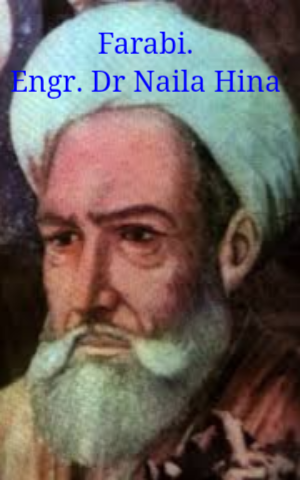Farabi. Engr. Dr Naila Hina
Farabi. Engr. Dr Naila Hina


Alfarabi was referred to as the “second teacher” in the Islamic world, the first being Aristotle, because of his commentaries on Aristotle and his work in logic. Not only did he make commentaries on Aristotle's work, but also on Plato and his work.
Aristotle was revered among medieval Muslim scholars as "The First Teacher", and among medieval Christians like Thomas Aquinas as simply "The Philosopher", while the poet Dante called him "the master of those who know".
Al-Farabi sees logic as the path to happiness (Germann, 2015)
Al-Farabi (d. 950) describes a musical instrument called Al-Tunboor Al-Baghdadi which was used in his time. The instrument's frets (dasateen, a Persian word) gave a "pre-Islamic scale." It was a quarter-tone scale which was developed by dividing a string into forty equal parts.
Al-Shahrazūrī who lived around 1288 and has written an early biography also states that Farabi hailed from a Persian family. According to Majid Fakhry, an Emeritus Professor of Philosophy at Georgetown University, Farabi's father "was an army captain of Persian extraction."
Abu Nasr Al-Farabi known in the West as Alpharabius; was a renowned early Islamic philosopher and jurist who wrote in the fields of political philosophy, metaphysics, ethics and logic. He was also a scientist, cosmologist, mathematician and music theorist
Born: 870 AD
Died: 950 AD, Damascus, Syria
Full name: Abu Nasr al-Farabi
School: Aristotelianism, Neoplatonism, idealism
Era: Islamic Golden Age
Region: Islamic philosophy
Abu Nasr al-Farabi is widely regarded as the founder of philosophy within the Islamic world. Although he had some noteworthy predecessors, such as al-Kindi and al-Razi, he was the first philosopher of his epoch to command the unqualified respect of future generations.
Famous theory of Al Farabi, the ideal state, expose different logic of the collaboration and solidarity from classical idealism by defining core value on personal perfectness and maturity instead of maximizing material interest.
Virtue, according to Al-Farabi, – this is the best moral qualities. Virtues of Al-Farabi shares on ethical and intellectual. For ethical virtues he reckons temperance, courage, generosity and justice, to the intellectual – wisdom, intelligence and wit.






























































